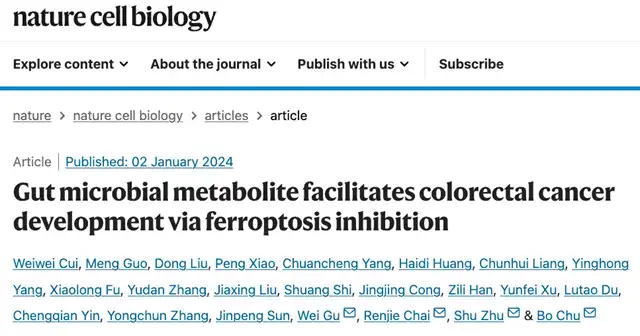Gut Microbial Metabolite Promotes Colorectal Cancer Through Inhibition of Ferroptosis
- Normal Liver Cells Found to Promote Cancer Metastasis to the Liver
- Nearly 80% Complete Remission: Breakthrough in ADC Anti-Tumor Treatment
- Vaccination Against Common Diseases May Prevent Dementia!
- New Alzheimer’s Disease (AD) Diagnosis and Staging Criteria
- Breakthrough in Alzheimer’s Disease: New Nasal Spray Halts Cognitive Decline by Targeting Toxic Protein
- Can the Tap Water at the Paris Olympics be Drunk Directly?
Gut Microbial Metabolite Promotes Colorectal Cancer Through Inhibition of Ferroptosis
- Should China be held legally responsible for the US’s $18 trillion COVID losses?
- CT Radiation Exposure Linked to Blood Cancer in Children and Adolescents
- FDA has mandated a top-level black box warning for all marketed CAR-T therapies
- Can people with high blood pressure eat peanuts?
- What is the difference between dopamine and dobutamine?
- How long can the patient live after heart stent surgery?
Gut Microbial Metabolite Promotes Colorectal Cancer Through Inhibition of Ferroptosis
A growing body of research suggests that the maintenance of metabolic balance by the gut microbiota is crucial. Dysregulation of the gut microbiota has been linked to various diseases, including inflammation, infections, gastrointestinal disorders, and tumors. The gut microbiota produces a variety of metabolites from undigested dietary components and endogenous compounds from the host. Some gut microbes contribute to tumor progression by producing carcinogenic metabolites. However, the potential mechanisms by which gut microbial metabolites regulate tumor development, especially through ferroptosis, remain poorly understood.
Ferroptosis, a novel iron-dependent form of programmed cell death discovered in 2012, is induced by the accumulation of peroxidized lipids. Unlike other forms of programmed cell death, ferroptosis is strictly regulated by GPX4, FSP1, BH4, and DHODH. Numerous studies have demonstrated the relevance of ferroptosis to cancer immunotherapy and tumor suppression, with various endogenous metabolites known to modulate ferroptosis.
The question arises: Can gut microbial metabolites influence the occurrence and progression of colorectal cancer through ferroptosis?
On January 2, 2024, a research paper titled “Gut Microbial Metabolite Facilitates Colorectal Cancer Development via Ferroptosis Inhibition” was published in the journal Nature Cell Biology by a team led by Professor Chubo from Shandong University School of Qilu Medicine, Professor Shu Zhu from the University of Science and Technology of China, Professor Renjie Chai from Southeast University, and Professor Wei Gu from Columbia University.
The study reveals that the gut microbial anaerobic digestion chain coccus (P. anaerobius) produces the metabolite indole-3-propionic acid (IDA) by breaking down tryptophan. Physiologically, IDA promotes tumor development both in vitro and in vivo by inhibiting ferroptosis. This research provides new insights into the treatment of colorectal cancer and the development of cancer therapies based on ferroptosis.

The gut microbiota plays a crucial role in human health, and emerging evidence suggests its involvement in tumor development through the production of carcinogenic metabolites. However, the molecular mechanisms behind this process are largely unknown.
In this latest study, the research team discovered that the gut microbial anaerobic digestion chain coccus (P. anaerobius) produces indole-3-propionic acid (IDA), promoting the development of colorectal cancer.
Mechanistically, IDA, as an endogenous ligand of the aryl hydrocarbon receptor (AHR), upregulates the expression of ALDH1A3 at the transcriptional level. ALDH1A3 utilizes retinaldehyde as a substrate to generate NADH, crucial for the synthesis of the ferroptosis-inhibiting protein 1 (FSP1)-mediated reduced coenzyme Q10 (CoQH10). In both in vitro and in vivo experiments, knockout of AHR, FSP1, or ALDH1A3 significantly eliminated IDA’s inhibitory effect on ferroptosis and its promotion of tumor growth.
Additionally, the study found a high enrichment of anaerobic digestion chain coccus in human colorectal cancer (CRC) patients. The researchers further validated that supplementing IDA or implanting anaerobic digestion chain coccus promoted the progression of colorectal cancer in ApcMin/+ or AOM/DSS-induced colorectal cancer in situ mouse models.
Emerging evidence suggests the involvement of gut microbiota in tumor development through the production of carcinogenic metabolites. However, a critical clinical question is whether blocking the interaction between gut microbial metabolites and host tissue cells can prevent tumor development.
This study confirms that a gut bacterial metabolite, IDA, promotes colorectal cancer progression by inhibiting ferroptosis. IDA exhibits a more significant role in regulating ferroptosis and colorectal cancer progression compared to other indole compounds. Specifically, IDA-mediated resistance to cancer cell ferroptosis relies on the AHR-ALDH1A3-FSP1 signaling axis, and blocking the IDA-AHR-ALDH1A3-FSP1 pathway may be beneficial for colorectal cancer treatment.
This research is essential for understanding the role of different tryptophan metabolites in tumor progression and provides new avenues for colorectal cancer treatment and the development of therapies based on ferroptosis.
Dr. Weiwei Cui, a postdoctoral researcher at Shandong University, doctoral student Meng Guo from the University of Science and Technology of China, and Dr. Dong Liu from Shandong University are the co-first authors of the paper. Professors Chubo from Shandong University, Shu Zhu from the University of Science and Technology of China, Renjie Chai from Southeast University, and Wei Gu from Columbia University are the co-corresponding authors.
Gut Microbial Metabolite Promotes Colorectal Cancer Through Inhibition of Ferroptosis
References:
https://www.nature.com/articles/s41556-023-01314-6
(source:internet, reference only)
Disclaimer of medicaltrend.org
Important Note: The information provided is for informational purposes only and should not be considered as medical advice.



